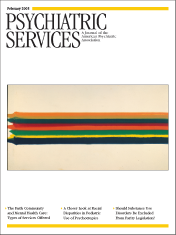To the Editor: The research field of medical decision making aims to analyze and improve physicians' decisions. In psychiatry, drug choices are among the most important decisions for patients' well-being. However, we have only limited knowledge about factors that influence psychiatrists' treatment choices for patients who have schizophrenia. To examine this issue, we conducted interviews with 100 psychiatrists about patients with schizophrenia who were currently in treatment. The survey was carried out in summer 2002 and was approved by the ethics committee of the Technische Universität München. In an initial analysis we found that, contrary to expectations, it was not patients' characteristics, such as symptoms and age, that predicted antipsychotic drug choice but, rather, the age of the psychiatrist (
1).
We then conducted a subsequent analysis with a subsample of 50 hospital psychiatrists who were treating a total of 128 inpatients with schizophrenia to study the reasons psychiatrists give to justify their drug choices. For this purpose the audiotaped interviews in which the psychiatrists explained their drug choices were reanalyzed. All reasons were categorized according to a defined coding scheme.
"Present symptoms" was the category most frequently cited (107 patients, or 84 percent), followed by "clinical history" (104 patients, or 81 percent), "side effect profile of the compound" (102 patients, or 80 percent), "efficacy of medication in general" (101 patients, or 79 percent), "patient's previous medication" (101 patients, or 79 percent), and "patient's preferences" (37 patients, or 29 percent). "Ease of administration" (five patients, or 4 percent) and "external variables," such as costs and therapeutic standards, (21 patients, or 16 percent) were rarely cited.
Thus, in choosing antipsychotic medications for inpatients with schizophrenia, most inpatient psychiatrists use criteria that are recommended in treatment guidelines, such as consideration of the side effect profile, and only rarely use criteria that differ from guideline recommendations, such as the general superiority of a certain compound.
Our results also reveal typical difficulties in the research area of medical decision making. Asking psychiatrists directly about their deliberations seems to elicit answers that reflect generally accepted treatment guidelines, whereas the predictors found in our initial analysis (
1) emphasize the key role of personal attitudes, experiences, and beliefs. Thus different aspects of medical decisions are highlighted, depending on the research method.
In our opinion, the two approaches—asking physicians directly about their motives and reasons through methods such as direct interviews and thinking-aloud protocols and attempting to objectively measure their motives and reasons by studying their prescribing practices and identifying predictors—have their benefits and drawbacks. Direct questioning, thinking-aloud protocols, and process tracing methods may help us understand a physician's thought processes. However, the results obtained by use of these methods are often biased by social desirability; for example, a physician is not apt to cite drug company representatives or cost issues as reasons for choosing a certain medication. On the other hand, correlations between prescriptions and objective measures, such as age and severity of illness, offer only limited insight into how decisions are actually made. Thus further research should use a combination of both approaches or attempt to vary important factors in real-world settings and observe how decisions change.
However, as our results show, research on medical decision making in the field of mental health is necessary and should be emphasized to improve the quality of everyday medical care.

